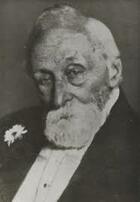
Wilhelm von Gwinner (Frankfurt am Main, 1825-1917) descended from a family of lawyers. He studied law, theology, and philosophy, and served as a Supreme Court justice in his hometown.
He was always passionate about philosophy and mysticism, and even published a literary work in his youth called Diana and Endymion, influenced by Goethe, whom he admired. For years, moreover, he worked on an ambitious essay on Goethe's Faust, which he never published. After his death he left unpublished manuscripts with the order that they were not published until thirty years later, but the bombs of World War II destroyed them.
His inclination for his philosophy led him to meet Arthur Schopenhauer, 37 years his senior. Shortly before his death, Schopenhauer made her his executor and bequeathed his library and his manuscripts to her. In 1862 Gwinner published Arthur Schopenhauer presented from personal treatment, which generated both success and controversy, as Schopenhauer's friends accused Gwinner of plagiarizing an unpublished manuscript of the philosopher and later destroying it.
Later there were several editions of this work in 1878 and 1910, augmented under the title Life of Schopenhauer. Charlotte von Gwinner, the author's granddaughter, reissued the original edition in 1922 and 1963.




